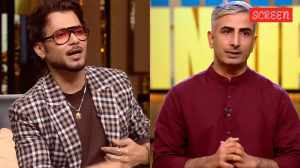And now, Rs 300 cr refund for Essar Steel
NEW DELHI, FEB 13: While the controversy over the Finance Ministry's bailout plan for Essar Steel is barely over, the ministry finds itse...

NEW DELHI, FEB 13: While the controversy over the Finance Ministry8217;s bailout plan for Essar Steel is barely over, the ministry finds itself in the thick of another one, this time involving a proposal to refund Rs 300 crore of import duty paid by the group in the early 8217;90s when they imported equipment for their steel plant. While the various officials of the ministry have pointed out that there is absolutely no precedent for refunding import duty once it has been collected, senior ministry officials have nevertheless held several discussions on the subject in the last couple of months.
Interestingly, the proposal was first rejected by P Chidambaram when he was the Finance Minister two years ago. Last year, it was rejected by the then Minister of State for Finance, R K Kumar, also on the grounds that import duty once collected could not be refunded. Both Chidambaram and Kumar also pointed out that, in its essence, the Essar proposal required that a law be applied retrospectively, and that this could not bedone.
Anxious to clear the proposal, however, the Ministry now proposes to send the matter to the Attorney General for his view. In addition, the customs department has been asked to give some more inputs on whether other steel companies have also made equipment imports in the last couple of years and whether they would also be in a position to make similar demands for duty refunds. Briefly, in 1992-93, Essar imported equipment for its steel complex at Hazira, and paid an import duty of Rs 300 crore on this. Some months prior to this, however, the state-owned Maruti Udyog wanted to import some equipment duty-free, and sought an exemption for this. Maruti argued that, if it was exempted from paying import duty, it would agree to export cars worth several times more than the duty foregone. Maruti was given the exemption, and Essar then began lobbying for the same concession for the steel imports it contracted.
Since the government didn8217;t clear the Essar proposal at that time, it had to pay the import duty.When in 1995, however, the Government formally introduced an Export Promotion Capital Goods EPCG scheme which allowed export obligations in lieu of import duty, Essar started pushing for its proposal afresh and asked for a duty refund. According to an Essar spokesperson, soon after the ad hoc exemption was given to Maruti Udyog, on November 5, 1993, the Government issued a press note inviting other companies to seek similar exemptions of import duty waivers against stiff export obligations 8212; on November 11, Essar applied for it. According to the spokesperson, 8220;Essar cleared imports by payment on duty under protest and under provisional assessment, pending applicability of the duty exemption under export obligations similar to Maruti Udyog. 8230; Essar8217;s request is legally tenable.8221;
Officials in the MoF who are opposing the move, however, point out that while the Government had invited companies to seek exemptions, but this obviously applied to imports which were yet to be made, not those which hadalready been contracted. Besides, the exemptions were to be applied for, and were not automatic 8212; Essar had never got the exemption.
1993:
In November, Maruti Udyog gets ad hoc import duty exemption for import of capital goods, against export obligation.
1995:
The government formally notifies an Export Promotion Capital Goods Scheme for duty-freeimports of Capital Goods against Export Obligation.
1997:
Finance Minister P Chidambaram rejects Essar plea for duty refund, saying import duties cannot be refunded. Also, unlike Maruti, Essar never got the duty exemption before it made the imports.
1998:
Minister of State for Finance R K Kumar rejects Essar case again.
1999:
In January, as well as late 1998, senior ministry officials hold meetingsto revive Essar proposal, and approve of it in principle. More inputs sought from customs and opinion of Attorney General to be sought before final approval.
- 01
- 02
- 03
- 04
- 05






























